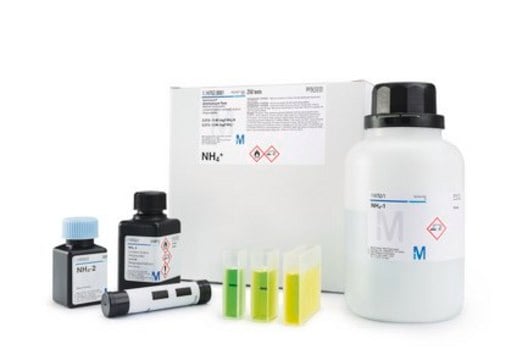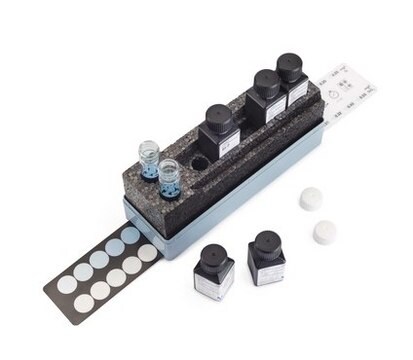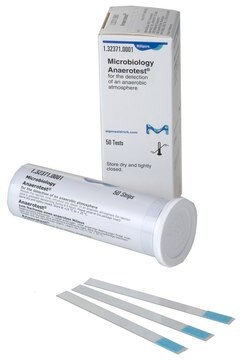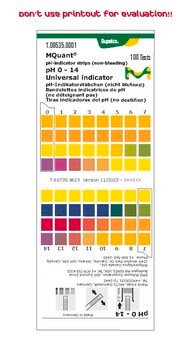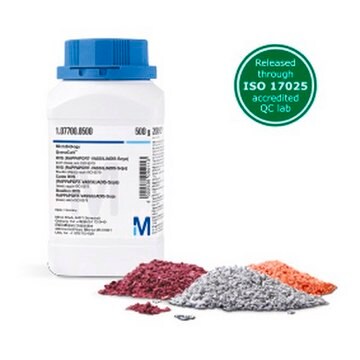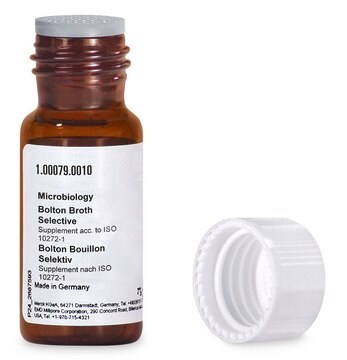1.18758
Ozone Test Kit, colorimetric
0.15-10 mg/L (O₃), MQuant®
Synonym(s):
Ozone Visual Test Kit
About This Item
Recommended Products
Product Name
Ozone Test, colorimetric, 0.15-10 mg/L (O3), for use with MCOLORTEST®
product line
MColortest®
Quality Level
specific analyte(s)
ozone
measuring range
0.15-10 mg/L (O3)
compatibility
for use with MCOLORTEST®
detection method
colorimetric
storage temp.
15-25°C
General description
- Drinking water
- Wastewater
- Process water
- Disinfectant solutions
- Swimming-pool water
Method
In weakly acidic solution ozone reacts with dipropyl-p-phenylenediamine (DPD) to form a red-violet dye. The ozone concentration is measured semiquantitatively by visual comparison of the color of the measurement solution with the color fields of a color disk. The test evaluates the color reaction based on the transmitted light method. So even turbid and colored water samples can be analyzed without further preparation. The color disk is made of very durable, lightfast plastic, thus suitable for industrial areas and wet environments.
Using the refill pack 1.18759 containing all the reagents, the original test kit can be used for a very long time, making it a particularly economical and ecological system.
Application
- Air Quality Monitoring: Ozone tests are crucial for monitoring air quality, particularly in urban and industrial areas where ozone pollution is a significant concern. These tests help in assessing the concentration of ozone in the atmosphere and its impact on public health and the environment. Recent research has reviewed various analytical methods applied for ozone gas detection, emphasizing their importance in environmental protection and regulatory compliance (Petruci et al., TrAC Trends in Analytical Chemistry, 2022).
- Environmental Research: In environmental studies, ozone tests are used to investigate the sources and distribution of ozone in different ecosystems. These tests are vital for understanding the chemical reactions that produce ozone and its role in atmospheric chemistry. Advanced analytical techniques, such as portable deep-UV absorption sensors, are employed to measure ozone levels accurately, providing detailed insights into environmental ozone dynamics (Zheng et al., Trends in Environmental Analytical Chemistry, 2023).
Legal Information
Signal Word
Danger
Hazard Statements
Precautionary Statements
Hazard Classifications
Eye Irrit. 2 - Repr. 1B - STOT RE 2 Oral
Target Organs
Thyroid
Storage Class Code
6.1D - Non-combustible, acute toxic Cat.3 / toxic hazardous materials or hazardous materials causing chronic effects
WGK
WGK 2
Flash Point(F)
Not applicable
Flash Point(C)
Not applicable
Certificates of Analysis (COA)
Search for Certificates of Analysis (COA) by entering the products Lot/Batch Number. Lot and Batch Numbers can be found on a product’s label following the words ‘Lot’ or ‘Batch’.
Already Own This Product?
Find documentation for the products that you have recently purchased in the Document Library.
Our team of scientists has experience in all areas of research including Life Science, Material Science, Chemical Synthesis, Chromatography, Analytical and many others.
Contact Technical Service